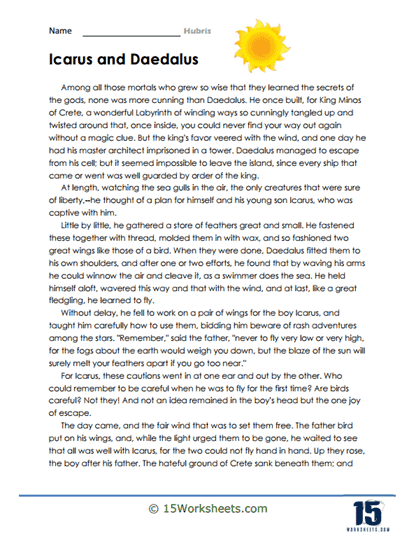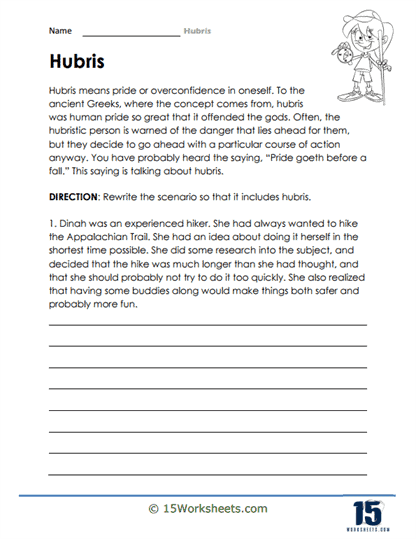Hubris Worksheets
All About These 15 Worksheets
Hubris, a term rooted in Greek tragedy, refers to excessive pride, arrogance, or overconfidence that often leads to one’s downfall. The concept of hubris transcends literature and history, offering valuable lessons about the consequences of unchecked ego and the importance of humility. This collection of 15 worksheets is designed to introduce students to the concept of hubris, helping them understand its significance, recognize its manifestations in literature and real life, and reflect on its implications for personal growth and ethical decision-making.
What Are Hubris Worksheets?
Hubris is a common theme in many classic and contemporary works, often used to teach a moral lesson about the dangers of excessive pride.
These worksheets contain exercises to help middle school students recognize and understand the use of this concept in various literary contexts. Here are some types of exercises that you might expect to see on these worksheets:
Definition and Examples – The worksheets start with a clear definition of hubris, followed by a few examples from well-known literature where characters display this trait. This section lays the foundation for understanding hubris as a literary device.
Identification Exercises – This activity involves short descriptions of characters or summaries of plots from different books. The students would be tasked with identifying which characters display hubris and how their actions demonstrate this trait.
Analysis Questions – Here, students answer questions about the role of hubris in a story. For example, “How did hubris lead to the character’s downfall?” or “What consequences did the character face as a result of their hubris?” These questions encourage students to think critically about the cause-and-effect relationship between a character’s pride and their eventual downfall.
Creative Writing Prompts – A section of the worksheet asks students to write a short story or scene featuring a character who displays hubris. This would challenge students to incorporate the concept of hubris into their own writing, helping them understand how this device can drive a plot.
Comparative Analysis – In this exercise, students compare two characters, one with hubris and one without. They would discuss how each character’s actions affect their outcomes in the story, thereby understanding the moral implications of hubris.
By completing these exercises, students not only learn to identify hubris in literature but also gain insights into character development, plot progression, and moral themes. It equips them with a better understanding of the dynamics of storytelling, enhancing their reading comprehension and analytical skills.
What is the Literary Device of Hubris?
Hubris, deriving from ancient Greek, refers to excessive pride, arrogance, or overconfidence in a character that often leads to their downfall. The main defining feature of hubris is this overconfidence to the point of disregarding warnings, norms, or ethics, which usually results in the character’s destruction or punishment. It’s a powerful literary device that enables authors to weave a narrative of caution, highlighting the destructive potential of pride and arrogance.
In literature, authors use hubris to create compelling character arcs and plotlines. Characters with hubris often ignore wise counsel or break societal rules, believing themselves to be invincible or superior. This creates tension and conflict within the story and engages readers by making them anticipate the character’s downfall. Moreover, hubris helps authors underline moral or ethical lessons about the perils of excessive pride or ego.
Examples of Hubris in Literature
Example 1 – Oedipus in “Oedipus Rex” by Sophocles
One of the most classic examples of hubris can be found in Sophocles’ ancient Greek tragedy. Oedipus, the protagonist, is prophesied to kill his father and marry his mother. Despite his efforts to avoid this fate, his hubris drives him to unknowingly fulfill the prophecy. Even when confronted with the truth, he initially refuses to accept it, believing he can outsmart the gods and destiny.
Sophocles uses Oedipus’ hubris to illustrate the ancient Greek belief that humans should not consider themselves equal to the gods. The narrative serves as a moral tale that excessive pride, defiance, and lack of humility before the gods lead to self-destruction.
Example 2 – Victor Frankenstein in “Frankenstein” by Mary Shelley
In Mary Shelley’s iconic novel, Victor Frankenstein’s hubris is evident in his scientific endeavor to create life. Despite the warnings of his professor, Frankenstein becomes obsessed with his experiments, believing he can rival nature itself in creating life. However, his creation, the Creature, becomes a monstrosity that brings about his downfall.
Shelley uses Frankenstein’s hubris to critique the unchecked pursuit of knowledge and power. Frankenstein’s excessive pride blinds him to the ethical implications of his actions, leading to tragic consequences, not just for him but for those around him.
Example 3 – Jay Gatsby in “The Great Gatsby” by F. Scott Fitzgerald
Jay Gatsby’s hubris lies in his belief that he can reclaim the past and win back the love of Daisy Buchanan. Despite the odds and the passage of time, Gatsby orchestrates an extravagant lifestyle built on illegal activities to impress Daisy. However, his overconfidence and refusal to accept reality lead to his tragic end.
Fitzgerald uses Gatsby’s hubris to critique the American Dream and the reckless pursuit of wealth and status. Gatsby’s excessive pride and fixation on an unattainable past ultimately cause his downfall, underscoring the hollow nature of materialistic pursuits.
Exploring the concept of hubris through this collection of 15 reflective worksheets offers students an opportunity to develop essential skills in literary analysis, ethical reflection, critical thinking, personal growth, and cultural awareness. Hubris serves as a cautionary tale, reminding us of the dangers of unchecked pride and arrogance.
By engaging with these exercises and activities, students not only enhance their academic abilities but also gain valuable tools for navigating complex ethical dilemmas, understanding human nature, and becoming more empathetic and responsible individuals in an ever-evolving world. The benefits of studying hubris extend far beyond the classroom, empowering students to be more thoughtful, self-aware, and considerate citizens of the global community.















